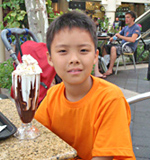教師:サム先生(ニュージーランド、30代)
生徒:遼太郎君(小学3年生、帰国子女) 健太君(英語専門コースの高校1年、留学予定)
私は、子供英会話レッスンのために、彼らの英語レベルに合うよう、また彼らにチャレンジさせるよう、授業内容を個人個人にオーダーメイドしています。
月ごとにプランを立て、彼らが毎週違うジャンルの英語に触れられるよう工夫しています。こうすることにより、1か月のコースでさらに広いジャンルの英語について上達させられます。例えば
レッスンは毎回、自由会話から始め、How are you feeling right now?今どういう気持ち?と質問して現在形を学ばせます。
過去形は What did you do today, last weekend?今日は何をしましたか、先週は何をしましたか?未来形はWhat will you do tomorrow or in the weekend?明日は何をしますか、週末は何をしますか?という具合です。
- 1週目:読解、ボキャブラリー、作文
-
現在は、ディズニーのストーリーブックのお話を読んでいます。話を筋を追って読む前に、ボキャブラリーを取り上げ、センテンスの中においてみたり、簡単な英語でその新しいボキャブラリーを説明したりします。それからまず、私が文を読み、それを生徒が繰り返します。1ページ読み終わったら質問を出して、生徒が内容を理解しているか確認します。また、例えばもし、あなたが主人公なら同じことをしますか?などと聞いたりします。こうすれば、子供は英語で自分の意見を言うことを学べます。お話が終わると、最初・中間・最後に何が起こったかを言わせながら、ストーリーの要約をさせます。
面白かったことを書かせるには、子供たちにトピックや質問を与えます。例えば、もし空を飛べるなら・・・など。
それから、その書かせたセンテンスを'Then I would' 'so that'などを使って、もっと長くするよう教えます。これは宿題として与え、次の週にチェックします。
- 2週目:前置詞とイディオム
-
前置詞を取り上げたワークシートを使います。動詞や形容詞と一緒につなげて、どうやって使うかの例を教えます。例えば、'talking to' talking with'など。
また、文章を読みながら、子供たちにそれらの言葉を指摘させます。前置詞の勉強を強化するため、宿題に多肢選択式問題を出し、翌週に答え合わせをします。
また、'I am running late'といった日常的なイディオムを学びます。遅れています、というときによく使う言い方です。
- 3週目:同音異義語、同義語、聞き取り
-
affectとeffect、roadとrode、wholeとholeといった単語を、違う文脈でどうやって使われているかの例を示しながら、同音異義語を教えます。
また、experimentとexperience、collaborationとcooperationのような同義語も教えます。これは新しい語彙を学ぶのには、楽しい方法です。
聞き取りには、いくつかの言葉を隠した形で、ストーリーを与えます。そして、すべてのストーリを読み終え、生徒はその言葉を穴埋めしなくてはなりません。
これは子供のリスニングとライティングのスキルを伸ばします。
- 4週目:文法、過去形と現在形の文章構造
-
私は、細長く切った紙のカードにセンテンスの一部を書いたものを作り、子供たちに正しい時制に合うようにカードを組み合わせさせ、学習を楽しめるように工夫しています。
あるカードには'He will arrive at' 、別のカードには'six O'clock tomorrow evening'とあります。子供は過去、現在、未来の時制が書かれているたくさんのカードから 、それらの正しいものを探すのです。
>> 子供英会話に通う遼太郎くんの体験談はこちら
I have tailored a lesson plan for each of my younger students to match there level of English and also challenge them. I design monthly plans so each week concentrate on a different area of English. This enables my students to improve over wider areas of English during the course of the month. For example,
I begin all my lessons with free conversation, practicing present tense by asking How are you feeling right now? Past tense by asking what did you do today, last weekend? And future tense by asking, what will you do tomorrow or in the weekend?
- Week 1: Reading, Vocabulary and writing.
-
We are currently reading a story from the Disney Story book, covering vocabulary before reading with rational by putting it into a sentence or using an easier word to describe the new word. I read first and the student repeats. After finishing one page, I ask questions to make sure the student is following the story. I also ask the student questions such as, if they were a character in the story would they do the same thing? This helps the student learn to tell their opinion in English. After finishing the story, I ask the student to summarize the story, by saying what happens in the beginning, middle and end.
To make writing more interesting I give the younger students topics or questions to write about. For example, if I could fly I would.... I then help the student make their sentences longer, by using words such as 'Then I would' 'so that'. I give this for homework and check it the following week.
- Week 2: Prepositions and Idioms
-
We are going through a worksheet, which has all the prepositions. I am giving examples of how they are used in conjunction with verbs and adjectives. For example 'talking to' talking with'. I am also getting the student to point them out while reading. I am reinforcing it by giving multi choice questions to do for homework and checking it the following week with rational.
We are also learning about popular everyday idiom such as 'I am running late'. This is a popular way to say you will be late.
- Week 3: Homophones, synonyms and dictation.
-
I am teaching homophones such as, affect vs effect, road vs rode, whole vs hole. I teach the difference by showing how each is used in a different context.
I am also teaching synonyms such as, experiment vs experience, collaboration vs cooperation. This is a fun way of learning new vocabularies.
I teach dictation by giving the student a story, which has some words missing. I read the whole story out loud and the student has to fill in the missing words. This helps the student improve their listening and writing skills.
- Week 4: Grammar, past and present sentence structure.
-
I make this fun by making cut out strips of paper with parts of a sentence on them and the student has to match with the correct tense. For example, One paper may have 'He will arrive at' on it the other paper will have 'six O'clock tomorrow evening' on it. The student has to find it among many other papers in past, present and future tense.


